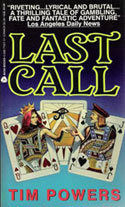
Now, you also spoke about your process and how you’re often inspired by real events, and then you develop characters from that and structure from that, and then the plot kind of follows. Could you give an example from one of your books about how that works?
Oh, sure. For my book Last Call, I read that modern playing cards are developed from a kind of simplification of Tarot cards. And I thought, well, that’s kind of cool, because they’re both, in their different ways, kind of perilous. And so I thought, “Well, let’s pursue that.”
And the Tarot card references led me to Eliot’s “The Wasteland,” because he talks about — at the beginning talks about Tarot cards, and the Hanged Man. So I reread “The Wasteland.” And since he’s talking about Fisher King type stuff — he talks about the Perilous Chapel and the Wasteland, and he says, “I will show you something different from [either] / Your shadow at morning striding behind you / Or [your] shadow at evening [rising to meet you]; / I will show you fear in a handful of dust.”
And I thought, “Well, OK, if I want to start in Southern California, where I live, and that’s obviously talking about somebody walking eastward, shadow at morning behind you…” I thought, “OK, if you’re moving East from Los Angeles toward a Perilous Chapel in the wilderness, having something to do with playing cards and Tarot cards, what are we talking about?” And you think, well, obviously, Las Vegas. Chapel in the Wasteland.
And what better place to go to get the cards into it.
Yes, exactly. And so I thought, “Well, so far I’m not making anything up. Let’s read about Las Vegas.” And so I read about Las Vegas and found that Bugsy Siegel had built the Flamingo Hotel in the middle of the desert with insane grandeur and elaborateness and just [a] needlessly spectacular and expensive place. And I said, “Well, that’s interesting. In Fisher King terms, why would he do that?” Well, he’s building a castle. And he was hanging out with gangsters named, like, Adonis, Joey Adonis. And Siegel then was killed, one eye shot out; you think one-eyed jacks. And he was killed on the day that this god Tamus (ph) traditionally died in Babylonian mythology.
And I thought, “Well, I’m still not making anything up. This is all real.” And so it became obvious to make him a Fisher King. He even owned one of the gambling boats off Santa Monica shoreline, called the Rex. OK, king. At this point, I start thinking, “I’m not making it up. I’m discovering it.”
And so […] I, of course, read a lot of history of Las Vegas and history of the gangsters associated with it, and details of poker and, given all that, I thought, “What kind of character would be useful to propel through this?” And I thought, well, a poker player who has quit, who will be called on to resume it.
And since I always think with a kind of supernatural polarity, I thought, “OK, you’ve got to come up with a poker game which uses Tarot cards to the peril of the players.” And the Fisher King is always injured in such a way as to make him sterile, and so I thought, “Well, our boy’s father should have been injured in this way. His father should be a Fisher King, that is.” And I thought, “How would he be injured in a way to make him sterile?” Well, shot in the crotch with a load of birdshot.
And so the situation and the research indicated the characters and the conflict. Which, as I said, is — my system for clipping a story together is kind of custom-made for somebody with no intrinsic imagination. I don’t have to make up the stuff; I simply have to find it and connect it.
Last Call was your first novel set in a contemporary setting. Was that challenging for you, to write something set in the present day, or did you basically use a similar method to what you did with, say, The Anubis Gates or any of your other earlier works.
I thought it would be a break. I thought it would be easy. I thought it would free me from a lot of the depth of research I’d…
Because people would already know things?
Well, I would already know things. I mean, I know how a telephone works. I know how a car works. I know about […] traffic signals, speed limits; I know about those things. But it turned out there was still a heap of research necessary, because I did not know what happens if you call 911 when somebody’s been shot. I don’t know what happens, you know, if a gunshot victim is in a hospital. What do the doctors say? In fact, what do they do? It turned out there was still a whole lot of research I had to do, even though I did know how we fasten our shoes. And how much ID a person has to legally carry. So I figured, well, contemporary is fun and has some strong advantages, but it doesn’t let you off the hook for research.

